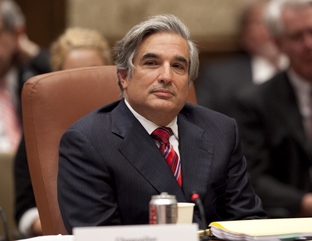For Higher Ed, Something Completely Different

The warring parties in the state’s ongoing debate over higher education reform experienced something new in the wake of this week's University of Texas System Board of Regents meeting: consensus.
Chancellor Francisco Cigarroa outlined a comprehensive action plan for the future of the system. In its nine main points, the plan nodded to both those who would like to see significant moves toward efficiency and accountability and those who would like to see academic research protected and universities spared from top-down micromanagement.
All nine UT regents voted yes on the plan without asking any questions of Cigarroa. Regent James Dannenbaum noted that the plan had brought about an atmosphere of “unanimity and collegiality." Regent Steve Hicks noted that the board's assent followed “an extremely challenging last six months” but acknowledged that the plan's implementation would require “diligence and hard work.” Regent Alex Cranberg, part of the last round of Gov. Rick Perry's appointees, also backed the "visionary" plan. "Some might even call it radical,” Cranberg said.
The Texas Public Policy Foundation, the Austin-based think tank whose proposed “breakthrough solutions” for higher education caused much of this spring's upheaval, also offered its support. “Today’s action plan from Chancellor Cigarroa is an important and welcome recognition that Texas students and parents can no longer afford business as usual from our state’s higher education institutions,” spokesman David Guenthner said in a statement. “The measures put forward today should lead to a better academic experience for students, and improved performance of the University of Texas System.”
Perry, who had promoted the "solutions," issued a statement applauding Cigarroa's plan, saying it “reflects important steps toward both increasing productivity and improving academic quality.” Other conservatives who have been critical of higher education, such as Americans for Propserity state director Peggy Venable, who held a press conference criticizing higher ed administrators just this week, issued similar sentiments.
Meanwhile, academics appeared similarly enthused. Tim Allen, who chairs of the University of Texas System Faculty Advisory Council, said the faculty supported the plan as well and looked forward to its implementation. Dr. John Mendelsohn, the outgoing president of University of Texas MD Anderson Cancer Center, called it “a blueprint for the nation, not just for Texas.” UT-Austin President Bill Powers, who has been critical of recent efforts by outside groups to evaluate the productivity of his institution’s faculty, said he believed Cigarroa’s vision “is in full harmony” with their approach to faculty evaluation.
Melinda Hill Perrin, a Houston philanthropist who is also a member of the Texas Coalition for Excellence in Higher Education — a group that formed, in part, to counter the TPPF’s approach — spoke at the meeting. She said that while “preserving the status quo” does not sit well with her or her fellow UT supporters, they “will not and have not stood idly by” while outside groups attempt to influence the universities. “We have experienced unprecedented times and been deeply troubled,” she said. But today’s events, she said, had given her “hope that, just perhaps, we have an opportunity to turn a corner.”
Senate Higher Education Chairwoman Judith Zaffirini, D-Laredo, who has been arguably the most outspoken critic of Perry and the TPPF, said she believed other university systems were taking notice. “I hope that today is a good example of how a system can come together under the right kind of leadership that requires collaboration at all levels,” she said.
Along with House Higher Education Chairman Dan Branch, R-Dallas, Zaffirini will continue to monitor the actions of regents throughout the state. The Joint Oversight Committee on Higher Education Governance, Excellence, and Transparency, which they co-chair, announced this week that it’s first hearing will be on Sept. 21.
The mood at that event should provide an initial indication as to whether the storm has passed, or if this is merely a lull.

